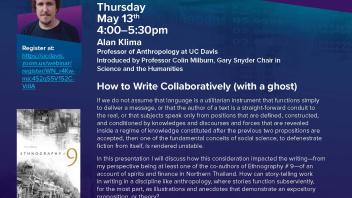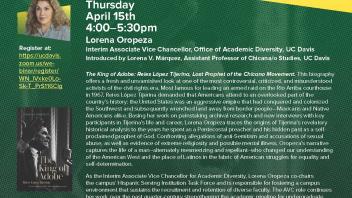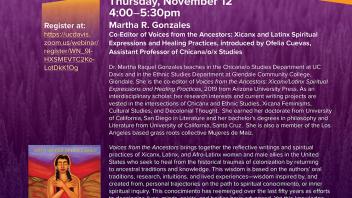Colloquium Series
All events are held in Hart Hall 3201 at 4pm unless otherwise noted.
Click the drop down boxes for dates, speakers, and webinar registration links.
Fall 2024 Colloquia
Cultural Studies PhD students enrolled in CST 290 must submit colloquium papers for four events.
October 24, 2024
"Stars, Earth, and Coral: Pacific Entanglements and Futures Beyond the Human" featuring Aimee Bahng, Nicole K. Furtado, and Frances Tran
The Department of Asian American Studies presents a roundtable presentation on how we can reimagine futures when we center Pacific, Oceanic, and Indigenous histories, aesthetics, and ways of knowing. Such a reimagining will raise questions and topics such as: going beyond the human in imagining the future; critiquing settler colonial practices and their relationships to capitalism; interrogating the blindspots within Asian American studies in relation to projects of reimagining the future.
Aimee Bahng is Associate Professor and Chair of Gender and Women’s Studies as well as American Studies at Pomona College. Author of the award-winning book Migrant Futures: Decolonizing Speculation in Financial Times (Duke University Press, 2018), she has also co-edited the Keywords for Gender and Sexuality Studies volume, with the Feminist Keywords Collective, as well as a special issue of Journal of Asian American Studies on Transpacific Futurities with Christine Mok. Her current book project, Settler Environmentalism and Pacific Resurgence, engages environmental law’s settler colonial history and points to alternative models of planetary accountability that highlight ongoing Native Pacific environmental movements.
Frances Tran is a Lecturer of English at Rollins College. Her research and teaching interests focus on Asian American and multiethnic literature and the genres of science and speculative fiction. She has published pieces in American Quarterly, the Journal of Asian American Studies, and The Cambridge Companion to American Literature and the Body. Her current book project, Sensational Futures: On Asian Racialization and Speculative Aesthetics (Duke UP), examines discourses of Asian futurity and the multisensory worlds of Asian American speculative fiction.
Thursday, 4:00pm-6:00pm, Hart Hall 3201
Counts as a colloquium for students enrolled in CST 290.
November 7, 2024
Jasbir Puar - details TBA
Thursday, 4:00pm-6:00pm, Hart Hall 3201
Winter 2025 Colloquia
Cultural Studies PhD students enrolled in CST 290 must submit colloquium papers for four events.
January 30, 2025
Cavar - "Failure to Comply"
Cavar is a fifth year PhD candidate in cultural studies, with a designated emphasis in science & technology studies. They are the author of Failure to Comply (featherproof books, 2024), and their debut poetry collection, Differential Diagnosis, is forthcoming from Northwestern University Press in 2026. Cavar’s work across genre and form explores transMadness at the limits of language, identity, and the imagination.
Book description: Every story has its fugitives. I, a deviant self-hacker with three arms, two stomachs, and no name, is on the run from RSCH, an high-tech, authoritarian government that mandates wellness and carves the contours of truth itself. When I is kidnapped at axe-point to be mined for forbidden memories, they must struggle against RSCH’s medical abuse to recapture their history, reunite with their lover, and rewrite their future –– or risk remaining Patient forever.
I crosses an epistolary, time-flipped dreamscape as they recollect their memories from RSCH’s hungry archive, and, in the process, write the story of their liberation.
Thursday, 4:00pm-6:00pm, Hart Hall 3201
February 6, 2025
"Re/Imagining Abolitionist Practices"
This symposium gathers scholar-activists, students, and the UCD community to foster a conversation about how to re/imagine abolitionist practices in Asian American Studies and beyond. Taking a historical, transnational, and liberatory approach, it fosters a conversation that engages with racial capitalism, U.S. imperialist militarism, prison and policing, immigrant/refugee justice, Indigenous sovereignty, disability justice, and environment justice, among many others.
Speakers:
Vernadette Vicuña Gonzalez is a professor in the Ethnic Studies at the UC Berkeley. She is an author of Securing Paradise: Tourism and Militarism in Hawaiʻi and the Philippines (2013) and Empire′s Mistress, Starring Isabel Rosario Cooper (2021).
A. Naomi Paik is an associate professor in the Global Asian Studies and Criminology, Law and Justice at the University of Illinois Chicago, She has published Rightlessness: Testimony and Redress in U.S. Prison Camps since World War II (2016) and Bans, Walls, Raids, Sanctuary (2020).
Iyko Day is a professor in English at the Mount Holyoke College. She is an author of Alien Capital: Asian Racialization and the Logic of Settler Colonial Capitalism (2016).
Thursday, 4:30pm-6:00pm, Hart Hall 3201
Asian American Studies Research Symposium
February 13, 2025
Jess Whatcott - “Towards a Eugenics History from Below: Researching California’s Disability Institutions in the Carceral Present”
Dr. Jess Whatcott is an assistant professor in Women’s, Gender, and Sexuality Studies at San Diego State University. Their research examines eugenics, the carceral state, and border imperialism by applying methodologies of critical disability studies, abolition feminism, queer and trans studies, and scholar activism. Whatcott’s first monograph Menace to the Future: A Queer and Disability History of Carceral Eugenics is out from Duke University Press. More of their writing has appeared in Feminist Formations; Signs: Journal of Women and Culture in Society; Lateral; Politics, Groups & Identities; and edited book collections.
Book description: Menace to the Future: A Disability and Queer History of Carceral Eugenics tells the story of California’s disability institutions in the early twentieth century. In the book, Jess Whatcott describes how the philosophy of eugenics demanded the confinement of disabled people in state hospitals, state homes for the feeble-minded, and reformatories. In this talk, Dr. Whatcott will describe the challenge of writing a history of disability institutions from the perspective of disabled and institutionalized people themselves. To ignore the perspective of the institutionalized person is to collude with eugenics, to disappear those labelled as dysgenic, and to obliterate the other possible futures that disabled and queerly bodied people could have created. This talk speculates on a “eugenics history from below” that seeks out forms of anti-eugenics consciousness decades before a politically organized disability rights movement emerged.
Thursday, 4:00pm-6:00pm, Hart Hall 3201
March 6, 2025
Cristiana Giordano and Greg Pierotti - “Affect Theater a Performative Book Talk”
How does an ethnographer remain affected by worlds encountered after leaving the field of research? How does a theater maker build theatrical worlds from empirical research that convey not only story, but affective experiences? Affect Theatre is a thinking and acting space for experimenting with these questions. In this talk, Giordano and Pierotti will describe their cross-pollination between social research and narrative practices in theater and anthropology. Affect Theater creates a dialogue between these disciplines in a laboratory format, using theatrical techniques to engage empirical questions and material. Rather than merely enacting or performing ethnographic findings, Affect Theatre puts the elements of the stage (lights, sets, objects, sound, bodies, images, etc.) into conversation with research material. This generates surprising and often more affective analyses. They will discuss their practice in particular and more broadly how the social sciences and the arts meet in a practice-oriented way.
Cristiana Giordano is Associate Professor of Anthropology at the University of California, Davis. She received her Ph.D. from the University of California, Berkeley. Her book, Migrants in Translation. Caring and the Logics of Difference in Contemporary Italy (University of California Press, 2014), won the Victor Turner Book Prize for ethnographic writing (2016), and the Boyer Prize in Psychoanalytic Anthropology (2017). Her current research investigates new ways of rendering ethnographic material into artistic forms. She has been collaborating with playwright and director Greg Pierotti on a new methodology at the intersection of the social sciences and performance. They have created Unstories, a 50-minute performance around the current “refugee crisis” in Europe, and Unstories II (roaming), a 45-minute performance which furthers the reflection about movement and borders.
Greg Pierotti is an associate professor of theater at the University of Arizona. He is a playwright, theater director, and actor. He co-authored the plays The Laramie Project, Laramie: 10 Years Later, The People’s Temple, and Unstories I and II. He co-authored the book Moment Work: Tectonic Theater Project's Process of Devising Theater. His honors as a writer/director/deviser include a Humanitas Prize, The Will Glickman Award for best new play, and Emmy, Lortel, Drama Desk, and Alpert Award nomintations. Since 2015, he and Cristiana Giordano, he have developed a method for research, writing and theatrical devising called "Affect Theater.” Together they have created performances and authored articles that play at the intersection of Anthropology and Theater. Their new book, Affect Ethnography: Exploring Performance and Narrative in the Creation of Unstories was published in June 2024 by Bloomsbury.
Thursday, 4:00pm-6:00pm, Hart Hall 3201
Spring 2025 Colloquia
Cultural Studies PhD students enrolled in CST 290 must submit colloquium papers for four events
April 3, 2025
Jan Padios - "Empire’s Hidden Haciendas: New Plantation Geographies Between Hawaiʻi and the Philippines"
In the 19th century, American missionaries-turned-traders colonized Hawaiʻi, creating vast sugarcane plantations across the islands. While the history of Hawaii’s “Big Five” and the Hawaiian Sugar Planters’ Association (HSPA) has been well documented, their early 20th century exploitation of the Philippines, also a US colony, is more obscure. This talk traces the emergence of the Hawaiian-Philippine Company and its establishment in Negros Occidental province. Padios will discuss how these geographies of power remained hidden for so long, and how highlighting them may impact our understanding of race, labor, land, and empire.
Jan M. Padios is an associate professor of American Studies and affiliated with the Asian American Studies Program at Williams College. She is the author of A Nation on the Line: Call Centers as Postcolonial Predicaments in the Philippines (Duke University Press, 2018), which was awarded Outstanding Achievement in the Social Sciences by the Association for Asian American Studies. Padios also publishes literary work and exhibits visual art, which have been featured in Indiana Review, decomp journal, the Hand Art Center, and at Carleton University. Her recent chapbook, 36 Dwellings, was published by Burrow Press in 2024. Padios is a graduate of New York University, Columbia University, and the Randolph College MFA program.
Thursday, 4:00pm-6:00pm, Hart Hall 3201
Sponsored by Asian American Studies and Cultural Studies
April 9, 2025
Maya Wind - "Frontier Resilience: Israeli Trauma Science in Colonial Landscapes"
A settler-colony, the Israeli state sends its citizens to live on its continually expanding frontiers. These communities serve as a living border, both enacting violence and experiencing it daily. This talk takes up the mental health programs directed at settler citizens living in frontier spaces: along the porous border with Lebanon, in the Occupied West Bank, and surrounding the besieged Gaza Strip. Drawing on ethnographic fieldwork with the clinicians that imagine and operate these programs, it shows how Israeli trauma science reproduces the state’s colonial project.
Maya Wind is a President’s and Andrew W. Mellon Postdoctoral Fellow at the University of California, Riverside, and a fellow at the Freedom and Justice Institute of Scholars for Social Justice. Her scholarship explores how settler societies and global systems of militarism and policing are sustained, with a particular focus on the reproduction and export of Israeli security expertise. Her first book, Towers of Ivory and Steel: How Israeli Universities Deny Palestinian Freedom (Verso 2024), investigates the complicity of Israeli universities in settler colonialism and apartheid.
Wednesday, 4:00pm-6:00pm, Hart Hall 3201













